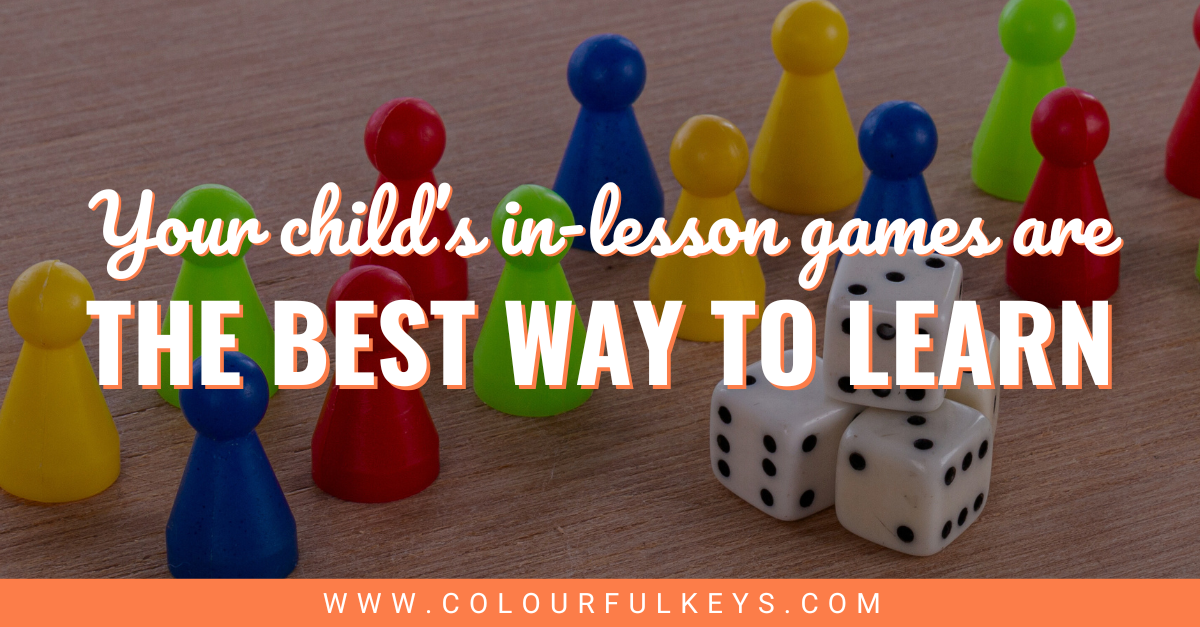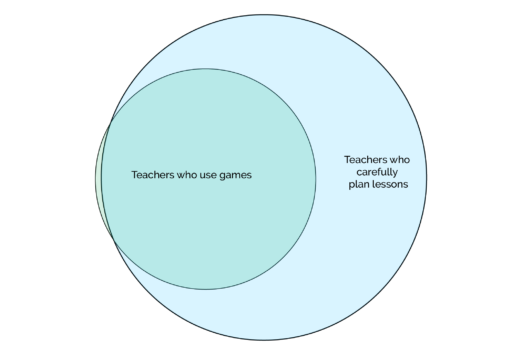Colourful Keys is primarily a blog for music teachers. However, this article is part of a series for PARENTS of music students. If you’re a music parent, read on to learn about the benefits of playing games in piano lessons. If you’re a teacher, feel free to pass the link to this article on to parents in your studio.
So your child’s piano teacher is playing games in their lessons. You might have questions about why they’re spending precious lesson time on music theory games when they could be at the piano. In this article, I’ll explain the purpose of these games and why this time is absolutely not wasted.

The games your child’s piano teacher is playing with them serve a purpose. Sometimes it’s very apparent (drilling note names or music theory terms, for example) and sometimes it’s a lot less obvious.
But I promise you, the teacher has a reason for doing what they’re doing.
I would guess that the Venn diagram of teachers who play games in lessons and teachers who plan lessons with care looks something like this:

In other words, if your child’s teacher is playing games with them in lessons, it’s almost a guarantee that they’re not “winging it”. It takes effort and forethought to prepare games for lessons.
Now, the question becomes this: Why did they choose to play a game to teach the concept they’re teaching? When we think about this, the alternative to the game is often not playing the piano. The game is being used instead of a verbal explanation or written theory work in the lesson.
With this understanding, there are many benefits to using a game to teach a concept rather than just explaining it or telling the student.
Benefits of Games
Benefit 1: Learning is More Durable
We can think about music theory games as doing two possible jobs: either they’re helping your child learn a concept, or they’re helping your child reinforce the concept.
If the student is meeting the concept for the first time, the game will often be designed so they’re figuring it out for themselves. When we work something out ourselves, and are guided by the teacher rather than being told the answer, it means we remember it better later.
Reinforcement games act as miniature quizzes that don’t feel like tests to the student.
Quizzes are one of the best learning tools we have. Study after study has proven that testing our knowledge is one of the most efficient ways to retain knowledge.
And yet, flashcards can get a bit dull. That’s where games step in and make practising concepts, terms and symbol identification more fun for your child.
Benefit 2: Learning is More Flexible
When we learn through play, we’re more able to apply that knowledge in different contexts.

In the context of piano lessons, this means that students will be more likely to understand the same idea in multiple different pieces of music if they learnt it through a game.
Benefit 3: Learning is More Engaging
When your child learns something by playing a game with their teacher, they’re not just having fun.
But they are having fun.
And that’s not a bad thing!
Think about your own classes in school. Did you learn the most from your most boring teacher?
Of course not. We learn more when we’re engaged in what we’re doing. Children pay attention when they’re playing games – not because they have to, but because they want to.
That means they learn more. It also lets them come out of their lesson feeling energised rather than zapped from all the “behaving” they had to do.
Does your child’s piano teacher use games?
What has your experience been like with your child playing music theory games? Feel free to leave your thoughts and questions in the comments, and we’ll do our best to help.
For more like this, check out other articles from our “music parent” series:
- How involved should you be in your child’s music practice?
- Why NOT to Teach Your Child Music Staff Mnemonics
- Help Your Child Develop a Solid Music Practice Habit
- Is your child’s piano practice “right”?
- Why is my child’s piano teacher playing games in lessons?
- Why does my child have piano listening assignments?